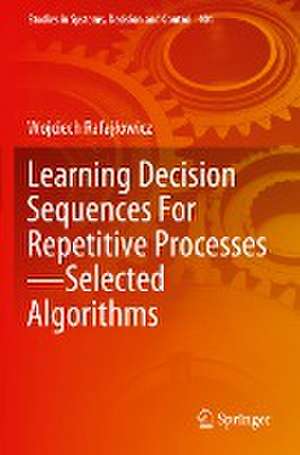Learning Decision Sequences For Repetitive Processes—Selected Algorithms: Studies in Systems, Decision and Control, cartea 401
Autor Wojciech Rafajłowiczen Limba Engleză Paperback – 27 oct 2022
| Toate formatele și edițiile | Preț | Express |
|---|---|---|
| Paperback (1) | 922.33 lei 6-8 săpt. | |
| Springer International Publishing – 27 oct 2022 | 922.33 lei 6-8 săpt. | |
| Hardback (1) | 928.58 lei 6-8 săpt. | |
| Springer International Publishing – 26 oct 2021 | 928.58 lei 6-8 săpt. |
Din seria Studies in Systems, Decision and Control
- 18%
 Preț: 937.89 lei
Preț: 937.89 lei - 18%
 Preț: 729.53 lei
Preț: 729.53 lei - 20%
 Preț: 627.42 lei
Preț: 627.42 lei - 15%
 Preț: 644.18 lei
Preț: 644.18 lei - 18%
 Preț: 900.80 lei
Preț: 900.80 lei - 18%
 Preț: 947.35 lei
Preț: 947.35 lei - 20%
 Preț: 1467.93 lei
Preț: 1467.93 lei - 15%
 Preț: 646.30 lei
Preț: 646.30 lei - 18%
 Preț: 1012.84 lei
Preț: 1012.84 lei - 15%
 Preț: 653.33 lei
Preț: 653.33 lei - 9%
 Preț: 655.02 lei
Preț: 655.02 lei - 20%
 Preț: 835.24 lei
Preț: 835.24 lei - 18%
 Preț: 1112.30 lei
Preț: 1112.30 lei - 20%
 Preț: 934.27 lei
Preț: 934.27 lei - 24%
 Preț: 726.60 lei
Preț: 726.60 lei - 18%
 Preț: 1004.81 lei
Preț: 1004.81 lei - 20%
 Preț: 924.74 lei
Preț: 924.74 lei - 18%
 Preț: 1010.48 lei
Preț: 1010.48 lei - 20%
 Preț: 932.21 lei
Preț: 932.21 lei - 18%
 Preț: 1007.35 lei
Preț: 1007.35 lei - 18%
 Preț: 752.43 lei
Preț: 752.43 lei - 18%
 Preț: 1000.24 lei
Preț: 1000.24 lei - 18%
 Preț: 999.45 lei
Preț: 999.45 lei - 18%
 Preț: 1016.81 lei
Preț: 1016.81 lei - 18%
 Preț: 949.73 lei
Preț: 949.73 lei - 18%
 Preț: 1119.38 lei
Preț: 1119.38 lei - 18%
 Preț: 1412.20 lei
Preț: 1412.20 lei - 20%
 Preț: 1163.21 lei
Preț: 1163.21 lei - 18%
 Preț: 1116.26 lei
Preț: 1116.26 lei - 18%
 Preț: 783.20 lei
Preț: 783.20 lei - 18%
 Preț: 952.09 lei
Preț: 952.09 lei - 20%
 Preț: 1472.54 lei
Preț: 1472.54 lei - 18%
 Preț: 1392.46 lei
Preț: 1392.46 lei - 20%
 Preț: 1180.52 lei
Preț: 1180.52 lei - 18%
 Preț: 1567.67 lei
Preț: 1567.67 lei - 20%
 Preț: 984.18 lei
Preț: 984.18 lei - 20%
 Preț: 369.86 lei
Preț: 369.86 lei - 20%
 Preț: 1281.17 lei
Preț: 1281.17 lei - 18%
 Preț: 1582.67 lei
Preț: 1582.67 lei - 18%
 Preț: 1112.30 lei
Preț: 1112.30 lei - 20%
 Preț: 1055.94 lei
Preț: 1055.94 lei - 18%
 Preț: 1405.90 lei
Preț: 1405.90 lei - 18%
 Preț: 961.55 lei
Preț: 961.55 lei - 20%
 Preț: 1053.48 lei
Preț: 1053.48 lei - 20%
 Preț: 1049.37 lei
Preț: 1049.37 lei - 18%
 Preț: 1005.74 lei
Preț: 1005.74 lei - 18%
 Preț: 1225.94 lei
Preț: 1225.94 lei - 18%
 Preț: 1232.26 lei
Preț: 1232.26 lei
Preț: 922.33 lei
Preț vechi: 1152.91 lei
-20% Nou
Puncte Express: 1383
Preț estimativ în valută:
176.49€ • 192.31$ • 148.72£
176.49€ • 192.31$ • 148.72£
Carte tipărită la comandă
Livrare economică 23 aprilie-07 mai
Preluare comenzi: 021 569.72.76
Specificații
ISBN-13: 9783030883980
ISBN-10: 3030883981
Pagini: 126
Ilustrații: XI, 126 p. 32 illus., 19 illus. in color.
Dimensiuni: 155 x 235 mm
Greutate: 0.2 kg
Ediția:1st ed. 2022
Editura: Springer International Publishing
Colecția Springer
Seria Studies in Systems, Decision and Control
Locul publicării:Cham, Switzerland
ISBN-10: 3030883981
Pagini: 126
Ilustrații: XI, 126 p. 32 illus., 19 illus. in color.
Dimensiuni: 155 x 235 mm
Greutate: 0.2 kg
Ediția:1st ed. 2022
Editura: Springer International Publishing
Colecția Springer
Seria Studies in Systems, Decision and Control
Locul publicării:Cham, Switzerland
Cuprins
Introduction.- Basic notions and notations.- Learning decision sequences.- Differential evolution with a population filter.- Decision making for COVID-19 suppression.- Stochastic gradient in learning.- Optimal decision sequences.- Learning from image sequences.
Textul de pe ultima copertă
This book provides tools and algorithms for solving a wide class of optimization tasks by learning from their repetitions. A unified framework is provided for learning algorithms that are based on the stochastic gradient (a golden standard in learning), including random simultaneous perturbations and the response surface the methodology. Original algorithms include model-free learning of short decision sequences as well as long sequences—relying on model-supported gradient estimation. Learning is based on whole sequences of a process observation that are either vectors or images. This methodology is applicable to repetitive processes, covering a wide range from (additive) manufacturing to decision making for COVID-19 waves mitigation. A distinctive feature of the algorithms is learning between repetitions—this idea extends the paradigms of iterative learning and run-to-run control. The main ideas can be extended to other decision learning tasks, not included in this book. The text is written in a comprehensible way with the emphasis on a user-friendly presentation of the algorithms, their explanations, and recommendations on how to select them. The book is expected to be of interest to researchers, Ph.D., and graduate students in computer science and engineering, operations research, decision making, and those working on the iterative learning control.
Caracteristici
Provides tools and algorithms for solving a wide class of optimization tasks by learning from their repetitions Includes unified framework for learning algorithms that are based on the stochastic gradient Written in a comprehensible way with the emphasis on a user-friendly presentation of the algorithms, their explanations
